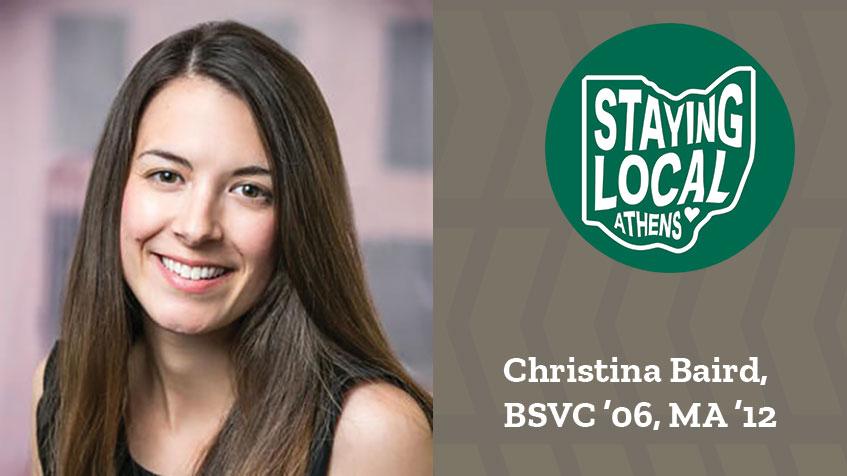Staying Local Series: Christina Baird, BSVC '06, MA '12
Hometown: Athens, Ohio
Year Graduated: 2006 (BSVC) and 2012 (MA)
School: Visual Communication
Major: Photojournalism, Interactive Multimedia
Current job title and location: I work remotely from Athens as senior designer at the Urban Institute in Washington, DC.
What do you do? I manage and design our forward-facing digital products. The products range from full websites or large-scale data visualization presentations to something as small as a gif that we tweet.
What made you come to Ohio University? Were there other places you considered? In the late 90's/early 2000's, there were really only a handful of schools offering degrees in photojournalism and OHIO was consistently ranked at the top. Looking to get away from home and the program that my father and grandfather started at OHIO (School of Visual Communication), I visited the University of North Carolina Chapel Hill. I selected OHIO when the professors there told me the OHIO program was stronger, a better deal financially and the place they learned everything they knew.
I was more focused in my return, and, for my graduate degree, I only applied to the School of Visual Communication at Ohio University.
How did the Scripps College of Communication equip you with the skills you needed to succeed? Critical thinking, the ability to take and give visual critiques are all skills I honed at Scripps, and I use them professionally all the time. Beyond what they taught me, there is also a wonderful alumni network that I've been lucky enough to lean on when I'm in a new city or looking for a job.
What about your experiences here was so memorable? I'm not sure I could condense down my college experiences. This is where I learned so much about myself. Athens and the University culture felt like safe spaces that valued learning, creativity and the very real benefit of failing.
Tell us about your career path. I began freelancing for newspapers, magazines and businesses from the age of 18. After graduating in 2006 with a degree in photojournalism, I took an internship in California and a year later got a job in western Pennsylvania. I worked there for two years, and, over the course of that time, saw massive layoffs and the markets crashed. I realized my dream of being a staff photographer was going to be dramatically different than what I wanted. I used graduate school as a hard reset and after eight years of working as a photographer and two years as a staffer, I set my sights on interactive design. My teachers at OHIO were incredible at helping me step from photography to coding and user interface design. I learned the importance of failure time and again. By 2012, I had completed a design internship at NPR, finished my master's degree and was starting a front-end design job in DC. My next move was to the Urban Institute. A Viscom alum called me and asked me to apply and I've been working here for six years. The job has shifted as our design team continues to expand, and I'm currently at a senior manager level working primarily on user interface design with our forward-facing digital products.
What were some of the reasons you decided to stay local for your career? Four years ago I negotiated to go remote to allow for more flexibility with my husband's career. We were hoping to live in a small town and had dreams of one day moving back to Athens. When he got a job at OHIO, I was already a remote employee.
How would you advise students in choosing where they should ultimately live and work? What do you want? That's a massive part of figuring out what degree you take and what jobs are available to you with that degree and, therefore, impacting where you can live. Being able to code and design is very marketable right now and affords me more options than my degree in photojournalism did. Both are desirable, but coding and designing are jobs you can do remotely, they pay better and the workplace culture is much more suited to my personality.
I wanted to live in a smaller city where I could afford to buy a house, pay for daycare and save a little money. Those felt so far from my grasp as a news photographer barely making ends meet and as a person living in an expensive East Coast city with loans to pay off. The flip side of working remotely is that there are less opportunities for advancement offsite than onsite. That was a tradeoff I was comfortable making.
What other advice do you have for current students? Stretch yourself out of a comfort zone even further than perhaps you already have and take advantage of the different people, different thoughts and the resources that are extended to students. Take the really interesting elective. Does the Latin dance night sound like fun? Go do it! Are you in need of a little extra help in that statistics class? There are free tutors at the library and teachers with empty office hours just waiting to help you. This is a point in your life when you have freedom, and you are encouraged to explore and try new things. Get out there and use the resources and community that this time in your life affords you.
